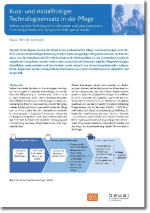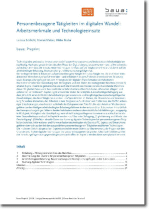- Project number: F 2503
- Institution: Federal Institute for Occupational Safety and Health (BAuA)
- Status: Completed Project
Description:
The world of work is undergoing a continual process of digital transformation, with different implications for different groups of employees and categories of tasks. This project investigated how the use of digital technologies affects people-related tasks and what design requirements should be adopted in response. People-related tasks involve doing things with, for, and to people and are characterized by direct interaction with people outside the organisational context. The range of such tasks is wide. They include medical, therapeutic and nursing care tasks as well as counselling, teaching, controlling or entertaining people. As the initial conditions for the digital transformation of people-related tasks can therefore be highly heterogeneous, two exemplary tasks were initially identified for the in-depth analyses: "caring for people" (e.g. in hospitals or elderly care facilities) and "controlling people" (e.g. in police work or within ticket checks in public transport).
The results of the project show that, from an occupational science perspective, digitalisation offers opportunities but also risks for the human-centered work design of both tasks, "caring for people" and "controlling people".
Technologies developed and tested for these tasks range from smartphones, smartwatch applications, sensor-based assistance systems and mobile camera systems to decision-support systems or applications for digital documentation. Potentials of such technologies such as the optimisation of physical and mental workloads contrasts with possible hazards such as an excessive reduction in the variety of demands or additional cognitive workloads.
In addition, the project results suggest that the use of digital applications – especially such that are supported by artificial intelligence (AI) – can be associated with developments that may affect the realization of core ethical principles (such as justice, autonomy, and non-maleficence).
Based on these results, three central premises (from the point of view of occupational safety and health) were identified for the use of digital technologies in person-related tasks:
- The deployment of digital technologies must aim to optimise work-related demands, avoid adverse workloads and maintain and promote the health of employees. Following on from this, it is helpful to assess before deployment in which fields of work digital technologies can exert a positive influence on work characteristics that are known to have an impact as a resource.
- The use of technologies must support the core characteristic of people-related tasks: The interaction with the individuals the tasks are aimed at. Digital technologies have the potential to impact not only employees (e.g. nurses, police officers) but also the people they come into contact with. Therefore, attention should also be paid to possible repercussions on employees’ work demands.
- The methods used to develop and implement digital technologies for people-related tasks should be user-centred. As the users are experts regarding the critical factors affecting their work practices, they should be involved in the development of the technology, but at the latest in the selection of the technology.
This project was conducted as part of the Federal Institute for Occupational Safety and Health (Bundesanstalt für Arbeitsschutz und Arbeitsmedizin, BAuA) focus programme "Occupational Safety and Health in a digitised World of Work".

